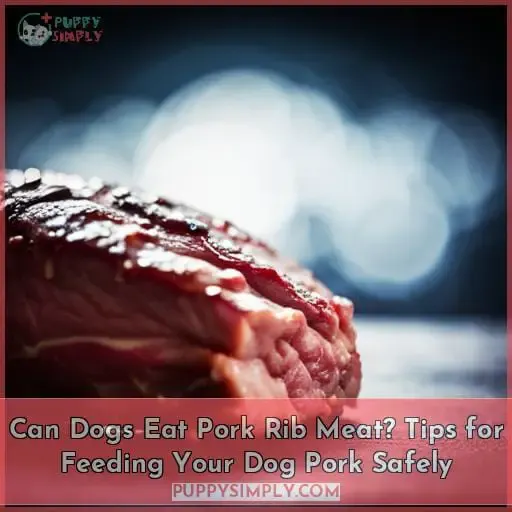This site is supported by our readers. We may earn a commission, at no cost to you, if you purchase through links.
 Are you wondering whether it’s safe for your canine companion to eat pork rib meat? Feeding a dog the wrong type of food can be detrimental to their health, so it’s important that you understand what is and isn’t suitable.
Are you wondering whether it’s safe for your canine companion to eat pork rib meat? Feeding a dog the wrong type of food can be detrimental to their health, so it’s important that you understand what is and isn’t suitable.
In this article, we will explore when pork can be dangerous for dogs and how you can feed them safely.
So let us delve into the topic of feeding your pup with all things porcine – from chops to rinds – in order to ensure both safety and satisfaction at mealtimes.
Table Of Contents
- Key Takeaways
- When is Pork Bad for Dogs?
- How Can I Feed My Dog Pork?
- Can Dogs Eat Raw Pork Meat?
- Can Dogs Eat Cooked Pork Bones?
- Can Dogs Eat Cooked Pork?
- Is It Safe for Dogs to Eat Pork?
- Can I Feed My Dog Raw Pork?
- How Much Pork Can a Dog Eat?
- Can I Give My Dog Pork Bones?
- Is Preserved Pork, Such as Ham and Bacon, Safe for My Dog to Eat?
- What is an Alternative Meat to Feed My Dog?
- Frequently Asked Questions (FAQs)
- Conclusion
Key Takeaways
- Feeding dogs raw or undercooked pork rib meat can be harmful and pose a risk of bacterial contamination and parasites.
- Pork rib meat has a higher fat content, so lean cuts should be preferred to avoid obesity-related diseases.
- Some dogs may have allergies to certain proteins found in pork rib meat, so monitor their response after consumption.
- Cooked pork rib bones should be avoided as they can splinter and cause injury or blockages.
When is Pork Bad for Dogs?
You should be aware that pork can be harmful to your pet if it’s not cooked properly. Raw pork bones, raw pork meat, and cooked pork bones can present a choking hazard as they are too hard for dogs to digest and may even splinter inside their digestive tract.
Eating raw or undercooked liver is particularly dangerous. It can lead to Vitamin A toxicity, which could cause severe damage to the liver of your dog over time, resulting in death.
Food poisoning from eating contaminated food, such as spoiled meat, or tapeworms caused by ingesting undercooked pig products, are also risks associated with consuming any type of uncooked animal product, including pork ribs.
Pork has a higher fat content than most other meats. So if you do feed it, make sure it’s lean cuts only and avoid giving them fatty pieces like bacon rinds. These can likely increase their risk for pancreatitis, among other diseases related to obesity, such as diabetes mellitus or heart failure.
Finally, some dogs have allergies towards certain types of proteins found within pig tissue. So beware when introducing new foods into their diet. Monitor closely how they respond after consumption, just in case an allergic reaction needs immediate medical attention.
How Can I Feed My Dog Pork?
If you’re considering feeding your pet pork, it’s important to make sure the meat is cooked thoroughly and to prefer lean cuts of meat. It’s also essential to monitor how much pork you feed your dog, as a safe quantity will differ for each individual animal.
Consider substituting canned or processed pork products with other healthy proteins such as chicken, turkey, or beef instead. For added flavor, try seasoning with herbs and vegetables that are safe for dogs, rather than adding salt-based seasonings, which can be dangerous in large doses.
Additionally, avoid giving any pieces of fat from the cut of meat, as this can irritate their stomachs if consumed in excess amounts over time.
To ensure safety when feeding your pup pig products, always consult an expert beforehand.
Pork rib bones should never be given due to the risk associated with choking hazards from uncooked animal remains.
Follow these simple steps before introducing new foods into your dog’s diet, including those derived from pigs, and they’ll stay happy, healthy, and full!
Can Dogs Eat Raw Pork Meat?
When it comes to feeding your pup pork, raw meat should never be an option. While the safety of cooked pork is up for debate, there are certain risks associated with consuming uncooked animal remains that can cause serious health problems in pets.
To ensure optimal nutrition and safety when introducing any new food into your dog’s diet, including pig products, it’s important to consider quality, preparation methods, cuts of meat used, as well as the nutrients they provide.
Pork ribs and rinds should always be avoided due to potential choking hazards from uncooked animal parts, while plain cooked pork generally does not pose a problem if consumed in moderation.
Additionally, trichinella spiralis, a parasitic roundworm, may also exist in undercooked or raw meats, which could lead to adverse reactions if ingested by dogs.
By researching thoroughly before buying any cut of pig product, you’ll ensure that only high-quality ingredients make their way onto your furry friend’s plate.
Can Dogs Eat Cooked Pork Bones?
Though cooked pork bones may be tempting to your pup, they should be avoided due to the potential for splintering and causing internal damage.
Bone size is an important factor when deciding if a particular cut of meat is safe for dogs. Pork rib bones tend to be too small and can easily break into sharp pieces that could cause injury or blockages in their intestines.
Additionally, dietary needs must also be taken into consideration since not all pets have the same nutritional requirements. Excessive amounts of fat found in many common pork products like sausage and chops could lead to gastrointestinal issues such as vomiting and diarrhea.
Finally, it’s critical that food allergies are considered prior to feeding any type of meat, especially those with barbecue sauce or other seasonings which can add unwanted ingredients like garlic or onion powder that may prove toxic.
Ultimately, regular vet visits will help ensure your pet’s health stays top-notch while still providing them with the necessary nutrition from quality cuts of pig products.
Can Dogs Eat Cooked Pork?
It’s important to know what types of pork products are safe for your canine companion. Can dogs eat cooked pork? While certain cuts such as chops and ribs may be okay in moderation, others like sausage and bacon should be avoided due to their high fat content.
Even something seemingly innocuous like pork rinds can contain harmful additives that can cause digestive discomfort or even worse, toxicity.
Can Dogs Eat Pork Chops?
You can give your pup a tasty treat by offering them pork chops, but it’s important to be aware of any potential health risks. When preserving safety, consider the nutrient benefits and portion size before feeding cooked pork.
Be mindful of cooking methods as well as what type of fat was used in preparation since this could affect their digestive health.
For an alternative with fewer complications, opt for meat-free raw pork bones perfect for puppies or those with total recall issues. Small amounts are best when introducing new foods so that you can monitor reactions over time.
What About Pork Sausage?
If you’re considering pork sausage for your pup, remember that it may contain higher levels of fat than other forms of cooked pork. It’s important to be mindful of the potential pros and cons when feeding dogs raw bones or processed meat as part of their diet.
Pork allergies can occur in some pups, so it is best to feed them smaller portions initially and monitor reactions over time.
Can Dogs Eat Pork Rinds and Bacon?
You may be wondering if dogs can snack on pork rinds or bacon. Generally, it’s best to avoid giving your pup either of these processed meats due to their high fat content and preservation methods used in production.
That being said, limited quantities of cooked pork products such as bacon and rinds can be served as treats for older dogs that are able to handle higher amounts of fat without digestive issues.
Additionally, remember that cooked meat with added preservatives should never replace regular dog food meals because this could lead to serious nutritional deficiencies over time.
Is It Safe for Dogs to Eat Pork?
It’s important to consider whether pork is a safe option for your pup when adding it to their diet, especially if the cut of meat is rib. Allergies can sometimes be an issue with any type of food, but pork allergies are less common than other meats like beef or chicken.
The fat content in some cuts should also be considered as too much can lead to digestive upset and could possibly contribute to muscle inflammation.
However, flavor preference and nutrition balance should still be taken into account when deciding what kind of meat will best suit your pup’s needs.
When introducing new foods into your dog’s diet, it’s important to take things slow in order not to cause stomach upset or worse sicknesses that require medical attention from a vet visit. This process may include starting out with small portion sizes (1-2 tablespoons), gradually increasing portions over time (a few days), until reaching the desired serving size (up to 2 1/2 cups).
To learn more about the safety precautions associated with feeding dogs pork ribs, please consult resources such as the Happy Puppy Handbook on the Dogsnet website, which provides valuable information regarding canine health topics such as these!
Can I Feed My Dog Raw Pork?
Feeding your pup raw pork can be a real rib-tickling experience – if you’re not careful! Raw feeding, while offering nutritional benefits, is not always the safest option. Pork meat, in particular, may contain more bacteria than other animal proteins and should therefore only be given as an occasional treat.
| Pros | Cons |
|---|---|
| Yummy Treat For Dogs | May Contain Bacteria |
| Great Occasional Dog Treat | Contains High Fat Content |
When considering whether to feed your dog raw pork, it’s important to think about how much of this type of food they will consume over time.
How Much Pork Can a Dog Eat?
When it comes to feeding your pup pork, there are a few things you should know. Pork cuts can vary in fat content and size, so be sure to check the labels or ask your butcher for guidance when shopping.
Additionally, fatty foods may be difficult for a dog’s digestive health, and protein intake should not exceed 25% of their diet to avoid any potential allergy risks.
Food safety is important. Make sure that pre-packaged meats are cooked thoroughly before serving them up as treats!
Lastly, bones from pork ribs can create sharp pieces that could injure your pup’s mouth if they chew on them.
While raw feeding has benefits if done properly with moderation in mind, every pet owner needs to take into account the risks associated with this type of meal, such as trichinella parasites or other bacterial contamination, before adding raw meat into their dog’s diet.
Can I Give My Dog Pork Bones?
You shouldn’t give your pup pork bones because of the potential for sharp pieces that could harm their mouth. Freezing pork can help reduce parasite risks. However, small amounts of fatty food and skin are okay in moderation.
Pork fat is rich in flavor and helps keep a dog’s coat healthy. However, too much may cause subtle symptoms like vomiting or diarrhea.
Additionally, leftover bone fragments should never be fed as tiny pieces of bones can create choking hazards or other health issues if swallowed by dogs. Lastly, while some dog owners opt for homemade pork jerky snacks over store-bought ones, this option still carries risk.
Is Preserved Pork, Such as Ham and Bacon, Safe for My Dog to Eat?
Though it may be tempting to give your pup a taste of preserved pork like ham or bacon, you should resist the urge as these meats can cause health issues in dogs. Allergies, parasites, and nutritional imbalances are possible consequences if not prepared and served correctly.
- Food allergies – while some breeds have no problem with certain types of food, others may suffer from an allergic reaction that could lead to skin irritations or digestive upset.
- Pork safety – check with the Gundog Trust for advice on safe handling practices when dealing with raw pork products.
- Nutrition facts – processed meats often contain high levels of sodium nitrate, which is linked to cancer-causing compounds.
It’s far safer to opt for unprepared substitutes such as lean chicken breast or fresh fish whenever possible!
What is an Alternative Meat to Feed My Dog?
If you’re looking for an alternative to feeding your pup pork rib meat, lean chicken breast or fresh fish are great choices! Lean meats such as boiled chicken can help maintain a balanced nutritional diet and avoid dog allergies.
Commercial diets offer pre-packaged alternatives like homemade jerky – but there are some controversial views on this type of food. Vegetarian and vegan options may also be available, depending on the pet store’s selection.
However, it is important to ensure that these diets provide all necessary nutrients needed for growth in dogs. Edible dental bones made from natural ingredients such as sweet potatoes or carrots can also make excellent treats that promote healthy oral hygiene without causing harm if consumed in moderation! Ultimately, when deciding what meat substitute is best suited for your pup’s needs, consider its overall health condition first before making any dietary changes.
Frequently Asked Questions (FAQs)
What are the health risks of feeding my dog pork?
Feeding your pup pork carries some potential health risks. Eating too much may cause digestive issues, and undercooked or raw meat could introduce bacteria into their system.
Is it better to give my dog cooked or raw pork?
It’s best to give your dog cooked pork, as raw pork can contain parasites and bacteria that could make them sick. Cooked pork will still provide nutritional benefits without the risk of contamination.
Is pork a good source of protein for dogs?
Yes, pork can be a great source of protein for your pup. It’s lean and rich in essential vitamins and minerals, plus it tastes delicious! Feeding them small amounts of cooked pork ribs is an excellent way to give them the nourishment they need.
Are there any pork alternatives that are safe for dogs to eat?
Yes! There are plenty of safe pork alternatives that you can feed your pup. Look for lean proteins like chicken, turkey, or fish to provide high-quality nutrition without the risk of overeating unhealthy fats.
How can I tell if pork is bad for my dog?
Examine the pork closely; discard it if it has a bad smell, discoloration, or slimy texture. Use your senses to determine whether your pup should eat it – trust them! Imagining how happy and healthy they’ll be can help you make the right choice for their diet.
Conclusion
In conclusion, it’s generally safe for dogs to eat pork, as long as it’s cooked and not served as a bone. Pork chops and pork sausage are both safe for dogs to eat, but should be served in moderation. Pork rinds and bacon aren’t recommended for dogs, as they’re too fatty and salty.
If you want to give your dog a treat, consider giving them a lean, cooked piece of pork. As an alternative to pork, lean proteins like chicken, beef, and fish are all great options for dogs. For example, a 70-pound Labrador Retriever can enjoy up to three ounces of lean, cooked chicken per day.

















